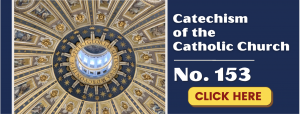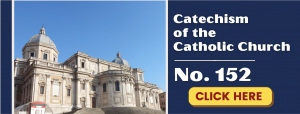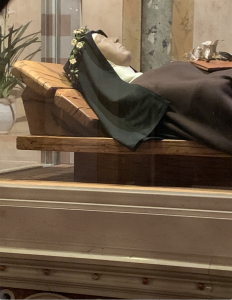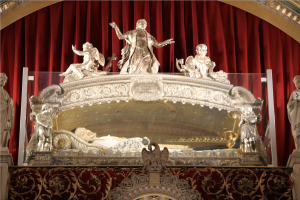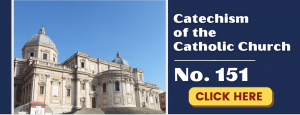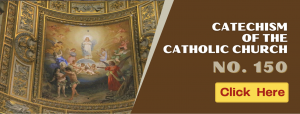Tuesday of the Thirty-first Week in Ordinary Time

“
“For greater things you were born.” (Ven. Mother Luisita)
TUESDAY, NOVEMBER 3rd Lk. 14: 15-24 “One of those at table with Jesus said to him, ‘Blessed is the one who will dine in the Kingdom of God.’
- Today’s Gospel is about a man who gave a great dinner and invited many who gave many excuses for not coming, so the servant was sent out to bring others to fill the banquet hall. In a parallel Gospel, (Matthew 22: 1-14) a king gives a banquet for his son. Again, those invited give excuses for not coming and the servants are sent out to bring anyone they find to the banquet. However, one man enters without a wedding garment and is cast outside into the darkness.
- We are invited to ponder… Who are those invited to a great dinner, to a banquet? Who are those invited who give all kinds of excuses why they cannot come? Who are those invited in their place? Who is the one thrown out into the darkness?
- The banquet has two meanings. The one giving the banquet and inviting all to come is the Lord and Creator of all! The banquet we are invited to is 1) the great banquet in the Kingdom of Heaven in the presence of our thrice Holy God, and 2) on earth, the banquet of the Eucharist – the Body, Blood, Soul, and Divinity of our Lord and Savior, Jesus Christ.
- Have we ever made excuses not to come to the earthly banquet – the Holy Sacrifice of the Mass to receive Jesus in Holy Communion? What is the “wedding garment” mentioned in the account of Matthew? That is Confession – the garment of Grace. If we die without this garment of Grace, we too will be cast out into the darkness.
- Saint Peter, our first holy Pontiff, says: “Above all, love each other deeply, because love covers over a multitude of sins.” (1 Peter 4:8)
- The best way to repair for our failure and lack of fervor in receiving these two great sacraments, Confession and the most Holy Eucharist, is to become apostles of these Sacraments that are channels of Grace in this present darkness, as well as for a holy and happy death for ourselves and others.
- The Scapular is also called the garment of Grace. Let us beg Mary, the full of grace, to make us fiery apostles for frequent Confession and daily Holy Communion!
BECOME A SOLID BRIDGE TO HEAVEN: Help souls to attain a holy and happy death! By Fr. Ed Broom, OMV
Saint Thomas Aquinas offers us this succinct definition for charity (which by the way means supernatural love); charity is to will the good of the other. What then would be the absolute, the greatest good for the other?
In the eyes of God, with regard to the human person, the greatest good that a human person can attain is the salvation of their immortal soul. Jesus expressed this truth with brilliant clarity in these unequivocal words: “What would it profit a man if he were to gain the whole world and at the same time lose his soul. What can a man give in exchange for his immortal soul?” (Mt: 16:26)
There are only two ways, two paths, two eternal destinies, and no more! Jesus says that the way that leads to destruction is wide and there are many who choose it. Jesus continues saying that the road that leads to eternal life is narrow and few that choose such a path—for this is the Way of the Cross. It is the Good Friday that leads to the glory of the Resurrection. In a word, either we choose the narrow way of the cross and follow Jesus unreservedly and so attain heaven; or we choose the broad path of ease, comfort, luxury, pleasure and sin and we lose our soul in the eternal flames, and this is forever.
The huge mass of humanity lives for the world, for its glamour, pleasure, power and fame. Their eyes are fixed only on what this world has to offer. Very few indeed have their eyes lifted on high to the reality of Heaven. All too few give much care or concern for their eternal destiny. The biggest tragedy in the world is to throw away one’s eternal salvation. How true the words of Jesus: “What does it profit a man to gain the whole world and lose his soul?”
This being the present state of affairs, let us prayerfully meditate upon the eternal Truths, of the reality of death, judgment, heaven, hell, and also of capital importance, eternity—meaning forever and ever and ever. Then let us strive to do all we possibly can to become a solid bridge by which many can cross from this life to Heaven to be with the Lord Jesus, His Mother, the angels and the saints for all eternity. Indeed, what are practical steps we can take to help those who are on the highway to hell to reach heaven?
1. PRAYER. Saint Alphonsus Maria Liguori stated point blank the indispensable necessity of prayer for our eternal salvation in these words that are cited in the Catechism of the Catholic Church: “He who prays much will be saved; he who does not pray will be damned.” A powerful Biblical example that illustrates this truth are the two men who were hanging on crosses between Jesus on the cross at Calvary that First Good Friday—the two thieves. One was lost; the other saved. The Good thief was saved precisely because he prayed at the end of his life. Prayer is talking to Jesus. The Good thief talked to Jesus and begged for mercy. Jesus responded immediately with these consoling and comforting words: “Amen, amen I say to you: today you will be with me in Paradise.” (Lk. 23: 43) His few but fervent prayers saved the thief and as Archbishop Fulton Sheen quipped: “And he died a thief because he stole heaven.”
2. MEDITATE UPON THE SHORTNESS OF LIFE. To the many who have drifted into no man’s land—The Waste Land of T.S. Eliot, that is to say into disbelief, doubt and skepticism, remind them how short and uncertain life really is. The Psalmist reminds us of this truth: “Our life is like the flower of the field that rises its head in the morning but withers and dies as the sun goes down.” (Ps. 103: 15-16) Saint Augustine comments on the ephemeral and transitory character of human life with these penetrating words: “Our life in comparison with eternity is a mere blink of the eye.” Saint James adds: “Our life is like a puff of smoke that appears and then is gone.” (Jas. 4:14)
3. UNCERTAINTY OF LIFE. Not only is human life a short breath, a puff of smoke in comparison to eternity, but also, all human life is very precarious, uncertain, and subject to change and that means death. On almost a daily basis we are exposed to untimely deaths: internationally, nationally, locally, and even on a personal or family basis. Not one of us can excuse ourselves from being taken aback or even shocked by some person who was cut down in the prime of their life by some freak accident. Not to be apocalyptic, but that could be you or me in any week, day, hour, or minute. Jesus warns us of the uncertain and precarious character of the human plight in the cogent, concise, and catastrophic Parable of the Rich fool. This man thought he had it made in the shade for a long life of ease, comfort, and pleasure. Jesus brought his utopian dreams to a screeching halt proclaiming to him that he would die that very night. And where will all his possessions go?
4. BRING THE WANDERING SHEEP, THE PRODIGAL SONS TO CONFESSION. Beyond a shadow of a doubt, one of the greatest acts of charity that you can accomplish is to convince a wandering sheep, or Prodigal Son or Daughter (Lk. 15: 11-32) to go back to God by means of a good Sacramental Confession. Give this wayward person, whose soul has infinite value, an examination of conscience pamphlet. Tell them where and when the confessions are. Accompany them to the Church and the Confessional. Tell them what to do when they confess. Then you go to confession first and come out with a radiant smile. Saint James promises that if we bring back a wandering soul, we save our soul and expiate a multitude of sins. (James 5:20)
5. RECEPTION OF THE LAST SACRAMENTS BEFORE THE LORD CALLS US. One of the greatest graces that we can receive would be to receive the Last Sacraments before we pass from this life to the next. There is a continuous Rite that a priest administers to the dying. The proper order is the following: Confession, the Anointing of the Sick, then the Eucharist, and if it were to be the last Communion, it is called Viaticum— meaning food for the Wayfarers on their way to the Lord. This would be the ideal order if the sick person had the physical strength, as well as the mental lucidity. Confession forgives sins; the Anointing of the Sick unites the suffering person to the Lord’s Passion on the cross and gives hope; the Eucharist, the Bread of Life, nourishes and gives strength for the last battle against the enemies of the soul.
6. APOSTOLIC PARDON. Very few are aware of the many treasures the Church offers to those who are willing to receive them. The Apostolic Pardon, taken from the treasuries of the Church which spring forth from the Passion, death and Resurrection of Jesus (The Paschal Mystery) is administered by the priest, usually after the final last three Sacraments. The words said by the priest are the following: “Through the holy mysteries of our redemption, may almighty God release you from all punishments in this life and in the life to come. May he open to you the gates of paradise and welcome you to everlasting joy.” Or “By the authority which the Apostolic See has given me, I grant you a full pardon and remission of all your sins in the name of the Father, and of the Son, and of the Holy Spirit.” With these words, said by the priest over the dying person, the dying person is granted full remission of their sins and a Plenary Indulgence. In concrete terms, upon receiving the Apostolic Pardon, the dying person can have full and total access to Heaven upon their death. What an incredible gift and how few Catholics are aware of this gift!
7. PLENARY INDULGENCES. Somewhat related to the Apostolic Pardon is that of the reception of what is called the Plenary Indulgence. If the conditions are met, the person that receives the Plenary Indulgence has all of their sins forgiven, as well as the temporal punishment due to those sins. If they were to die after properly receiving the Plenary Indulgence, they too could go to heaven immediately after their death. This being said the following are the conditions required to receive a Plenary Indulgence:
(1) SACRAMENTAL CONFESSION. First, the Sacramental Confession done with the priest must be accomplished. Well prepared, expressed, and with true and firm purpose of Amendment.
(2) SACRAMENTAL COMMUNION. Then, participation in Holy Mass with the fervent reception of Holy Communion —the Body, Blood, Soul, and Divinity of Jesus Christ.
(3) ACTION REQUIRED FOR THE PLENARY INDULGENCE. There are several possible actions, but we will offer three to choose from: 1) The Family Rosary or praying the Rosary in front of the Blessed Sacrament; 2) Making the Way of the Cross; 3) Meditate upon the Bible, the Word of God, for at least 30 minutes.
(4) PRAY FOR THE INTENTIONS OF THE PONTIFF. Next, praying for the intentions of the Holy Father, the Pope.
(5) FIRM PURPOSE TO GIVE UP SIN. Last but not least, to receive the Plenary Indulgence, the person must make a most firm purpose to give up all sin—both mortal and venial—as well as the near occasion of sin.
If these five conditions are carried out, then the individual can obtain a Plenary Indulgence, meaning his soul becomes innocent of all sins, as well as punishment for these sins. If the Lord were to call him from this life to the next at this very moment, he could have immediate access to Heaven! How many free gifts Jesus offers through His Church, but how few people take advantage of them!!!
8. PERFECT ACT OF CONTRITION. Another very important practice that must be preached and taught far and wide is the practice of striving to make a Perfect Act of Contrition as soon as one is aware of having fallen into mortal sin. This practice most especially should be practiced before retiring every night. Sacramental Confession is not always possible due to the shortage and lack of priests. However, one can make a Perfect Act of Contrition at any time and any place, if moved by the grace of God. By “Perfect Act of Contrition” is meant that our sorrow for mortal sin is not simply Fear of the Lord and fear of eternal punishment—this is Attrition or Imperfect Contrition. To be perfect, the sorrow must come from the depths of one’s heart with a firm purpose to avoid sinning in the future due to true love of God. In other words, we do not want to sin even in the slightest way because God loves us so much and we want to return His love with the love in our own heart. If the Perfect Act of Contrition is done, then the person is restored to the state of grace even before Sacramental Confession. However, upon the quickest occasion he should have recourse to Sacramental Confession.
9. CHAPLET OF DIVINE MERCY FOR THE DYING. When a person is dying, temptations, especially to give in to despair, can be very intense. A most powerful and efficacious means to save such a soul is to pray the Chaplet of Divine Mercy that Jesus taught to Saint Faustina and strongly recommended. Jesus said these words to Saint Faustina: “My daughter, encourage souls to say the Chaplet which I have given to you. It pleases me to grant everything they ask of me by saying the chaplet. Write that when they say this chaplet in the presence of the dying, I will stand before My Father and the dying person, not as the just Judge, but as the merciful Savior. (Diary # 1541) Earlier our Lord said to Saint Faustina, as recorded in the Diary: “At the hour of their death, I defend as my own glory every soul that will say it for a dying person, the indulgence is the same.” (Diary # 811). Even if one were not physically present to the dying, as long as the Chaplet is prayed, the dying person will still receive the extraordinary grace of salvation—through the Wounds of the merciful Savior! Therefore, let us do all we can to pray the Chaplet of Divine Mercy for the dying and to promote this little-known message and wonderful Promise.
10. OUR LADY: THE ROSARY AND ETERNAL SALVATION. Another powerful weapon that we have at our disposition to help us attain the grace of all graces, and that is to die in the state of grace, is to pray the most Holy Rosary on a daily basis. Saint Padre Pio spoke of the Rosary thus— “Give me my Weapon!” Indeed, if you and your family have formed the habit of praying the most Holy Rosary on a daily basis, then you are preparing yourself for death at least fifty times every day. How? Every time you say the words at the end of the Hail Mary, you say: “Holy Mary, Mother of God, pray for us sinners now and at the hour of our death. Amen.” By these words we are inviting Mary to be with us at the very moment we die, helping us to beg for forgiveness and God’s infinite mercy through her most powerful intercession.
In conclusion, Saint Alphonsus Liguori teaches us “the grace of all graces is to die in the state of grace.” If done, our soul is saved for all eternity. Therefore, we warmly encourage you to read this article, try to understand and even memorize its content. Then share this with your loved ones, as well as many who have wandered away from the faith. But most important: strive to live this message. If done, heaven will be yours for all eternity. May Our Lady pray for us now and at the hour of our death!
Copyright 2020 Oblates of the Virgin Mary
St. Peter Chanel Church, Hawaiian Gardens, CA



